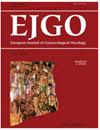Growing teratoma syndrome after surgery for ovarian immature teratoma
IF 0.5
4区 医学
Q4 OBSTETRICS & GYNECOLOGY
引用次数: 0
Abstract
Growing teratoma syndrome (GTS) is a condition characterized by tumor growth during or after chemotherapy for a germ cell tumor, albeit with normal tumor marker levels in the absence of histopathological evidence of immature teratoma components. We encountered a 10-cm large GTS lesion in the para-aorti nodes after fertility-preserving surgery for a grade 3 ovarian immature teratoma. The patient was a 20 year old woman who presented to the hospital with complaints of abdominal pain and swelling. Imaging examination revealed an ovarian tumor mass measuring 24 cm in the abdominal cavity, suspected to be composed of a mixture of fat and other components. The α-fetoprotein (AFP) levels were elevated at 853 ng/mL. We elected to perform fertility-preserving surgery. The surgical findings included a tumor in the right ovary, which was excised without rupture with adnexectomy. The histopathological diagnosis was grade 3 immature teratoma. Palpation of the pelvic and para-aortic lymph node areas did not reveal significant lymphadenopathy. Subsequently, a para-aortic node metastasis (major axis: 8 cm) was discovered before chemotherapy (19 days after surgery). We confirmed that there was no swelling before surgery and assumed that the immature teratoma had recurred. Chemotherapy was initiated, and the serum AFP levels normalized after 4 courses of bleomycin, etoposide, and cisplatin (BEP) therapy. However, the para-aortic node metastasis had grown further (major axis: 10 cm). Another open surgery was performed. The nodal mass was completely excised and pathology revealed only mature teratoma. Growing teratoma syndrome should be considered in the setting of a recurrent mass with negative tumor markers.卵巢未成熟畸胎瘤术后生长性畸胎瘤综合征
生长畸胎瘤综合征(GTS)是一种以生殖细胞肿瘤化疗期间或化疗后肿瘤生长为特征的疾病,尽管在没有未成熟畸胎瘤成分的组织病理学证据的情况下肿瘤标志物水平正常。我们在保留生育能力的3级卵巢未成熟畸胎瘤手术后,在主动脉旁淋巴结发现了一个10厘米大的GTS病变。患者是一名20岁的女性,她以腹痛和肿胀来医院就诊。影像学检查示腹腔内卵巢肿块,直径24 cm,疑为脂肪及其他成分混合。α-胎蛋白(AFP)水平升高至853 ng/mL。我们选择做保留生育能力的手术。手术发现包括在右卵巢肿瘤,切除无破裂的附件切除术。组织病理学诊断为3级未成熟畸胎瘤。盆腔及主动脉旁淋巴结触诊未见明显淋巴结病变。化疗前(术后19天)发现主动脉旁淋巴结转移(长轴:8cm)。我们在手术前确认没有肿胀,并假设未成熟畸胎瘤复发。化疗开始,博来霉素、依托泊苷和顺铂治疗4个疗程后血清AFP水平恢复正常。然而,主动脉旁淋巴结转移进一步扩大(长轴:10厘米)。又进行了一次开放手术。结节肿物被完全切除,病理显示只有成熟畸胎瘤。生长畸胎瘤综合征应考虑在设置复发肿块阴性肿瘤标志物。
本文章由计算机程序翻译,如有差异,请以英文原文为准。
求助全文
约1分钟内获得全文
求助全文
来源期刊
自引率
25.00%
发文量
58
审稿时长
1 months
期刊介绍:
EJGO is dedicated to publishing editorial articles in the Distinguished Expert Series and original research papers, case reports, letters to the Editor, book reviews, and newsletters. The Journal was founded in 1980 the second gynaecologic oncology hyperspecialization Journal in the world. Its aim is the diffusion of scientific, clinical and practical progress, and knowledge in female neoplastic diseases in an interdisciplinary approach among gynaecologists, oncologists, radiotherapists, surgeons, chemotherapists, pathologists, epidemiologists, and so on.

 求助内容:
求助内容: 应助结果提醒方式:
应助结果提醒方式:


